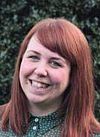Dr Beth Nicholls

Sensory and cognitive ecology of insect pollinators
We are interested in how sensory, cognitive and ecological processes shape the foraging choices of insect pollinators, and the impact of these decisions on plant-insect interactions and the provision of pollination services to wildflowers and crops.
Bees and other insect pollinators visit flowers to collect pollen and nectar, which together comprise the entirety of their diet and that of their offspring. We know that bees can use nutritional cues such as sugar concentration to assess the value of nectar rewards offered by flowers and guide their foraging decisions. However, we still know very little about how insects assess reward quality during pollen collection and the factors which shape flower choices when foraging for this resource. In part this is due to the nutritional complexity of pollen as a reward, but also the fact that unlike nectar, most bees do not consume pollen during collection
We use a combination of electrophysiology, flow-through respirometry and behavioural assays in both the lab and field to answer the following questions:
1. Do bees use taste to assess the nutritional quality of pollen?
Using single sensillum recordings from the sensory organs of bees (proboscis, antennae, tarsi) we are examining whether these insects have the capacity to perceive the main macronutrients present in pollen, namely proteins and lipids. By combining these recordings with behavioural taste assays, we can determine whether bees use such nutritional cues to guide their foraging choices. Taste perception is poorly understood in insects in general, but given the implications of bees’ foraging decisions for the pollination of wildflowers and food crops, this neuroethological approach has the potential to improve our understanding of the behaviour of a very ecologically and economically important insect group.
2. How costly is it to switch between different flower types during pollen collection?
Using a combination of behavioural foraging assays and flow-through respirometry we are quantifying both the time and energetic costs associated with switching between handling flowers of varying morphologies, and how this varies when rewards are more or less nutritious and require more or less effort to extract from flowers. We are also interested in differences among bee species with social vs. solitary life histories. We aim to use such data to develop and test agent-based models to understand how bees make decisions in different landscape with varying resource availability and diversity.
Collaborators
We are members of the Sussex Centre for Sensory Neuroscience and Computation (SNAC) and within Sussex Neuroscience we currently collaborate with Prof. Jeremy Niven on our gustatory and flower-handling costs work. We are also interested in future collaborations with Dr James Bennett to develop agent-based models of bee foraging decisions under different landscape-level food availability, parameterised by our behavioural assays, with Prof. Andy Philippides to track bee foraging decisions in the field and with Prof. Claudio Alonso to understand Drosophila behaviour under more ecologically realistic conditions.
For more details, please see the Nicholls lab webpage and profile.
Key references
- Goulson, D., & Nicholls, E. (2022). Anthropogenic influences on bee foraging. Science, 375(6584), 970-972.
- Nicholls, E., Krishna, S., Wright, O., Stabler, D., Krefft, A., Somanathan, H., & Hempel de Ibarra, N. (2019). A matter of taste: the adverse effect of pollen compounds on the pre-ingestive gustatory experience of sugar solutions for honeybees. Journal of Comparative Physiology A, 205, 333-346.
- Nicholls, E., & Hempel de Ibarra, N. (2017). Assessment of pollen rewards by foraging bees. Functional Ecology, 31(1), 76-87.